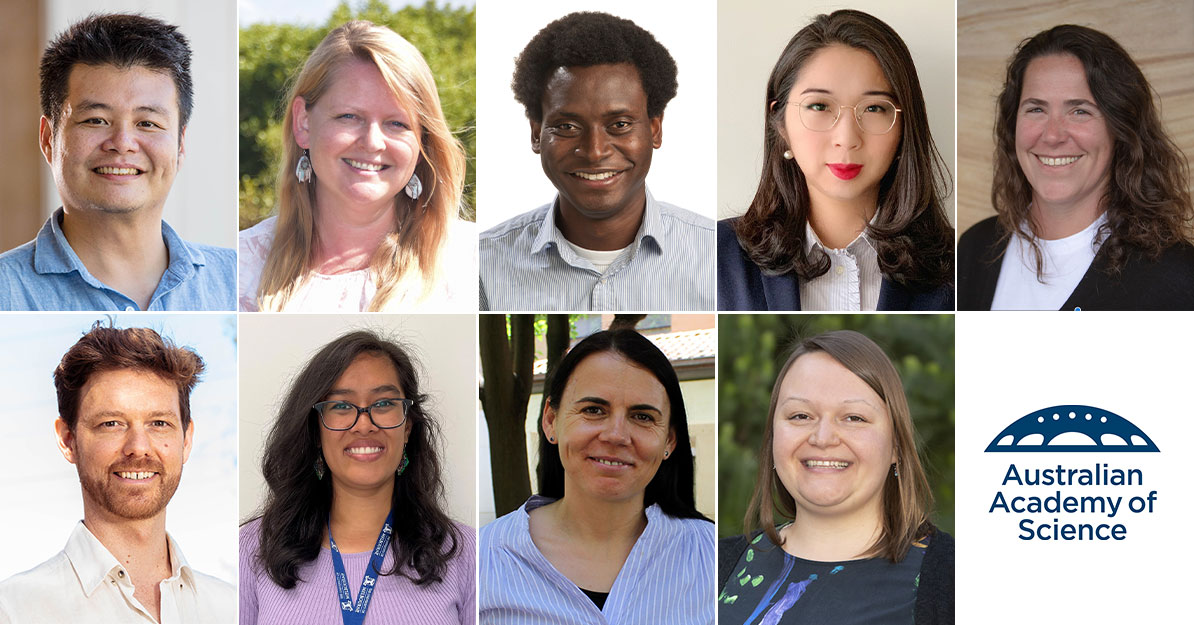‘Pure joy’: nine marine, soil and plant biologists awarded 2023 Thomas Davies Research Grants
- 5 mins read


(top from left) Dr Cheong Xin Chan, Dr Inka Vanwonterghem, Dr Onoriode Coast, Dr Chaoyu Li and Dr Mariana Mayer Pinto. (bottom) Dr Martin Breed, Dr Zahra Islam, Dr Joanna Melonek and Dr Maria Ermakova.
Nine early-career and mid-career researchers have been awarded the 2023 Thomas Davies Research Grant for Marine, Soil and Plant Biology.
The grant of up to $20,000 is awarded annually and funded through a generous philanthropic bequest from the estate of the late Thomas Lewis Davies to the Australian Academy of Science.
One of the recipients, Dr Onoriode Coast, said that learning he had been awarded the grant was “pure joy”.
Another recipient, Dr Chaoyu Li, said the support has improved her self-confidence and encourages her to pursue her academic career as an early-career researcher.
Applications for the 2024 round will open in early 2023.
Learn more about the Thomas Davies Research Grant.
Awardees and their projects
Dr Martin Breed, Flinders University
Harnessing the root-associated microbiota of the invasive species buffel grass to improve its management
Buffel grass is one of the most noxious invasive plant species in Australia, which degrades refuges for threatened native fauna, out-competes rare and endemic plant species and alters fire regimes. It is very hard to eliminate, and it is probable that buffel grass modulates its root-associated microbiota to gain a growth and survival advantage. Dr Breed aims to understand how this microbial community differs from surrounding soil, and how this association contributes to the establishment and invasion potential of buffel grass.
Dr Cheong Xin Chan, University of Queensland
Deciphering the molecular regulations of heat tolerance in a coral algal symbiont
Australia’s Great Barrier Reef (GBR) is sustained by symbiosis with microalgae, which supply essential nutrients and fixed carbon to their coral hosts. Breakdown of this symbiosis under environmental stress leads to coral bleaching, coral death, and collapse of the reef ecosystem. One of these microalgae species, D. trenchii, is known for its high heat tolerance, which can be conferred to the coral host—but the molecular mechanism is unknown. Dr Chan’s project will investigate how D. trenchii acquired thermotolerance and how we can identify and design highly resilient coral-alga symbioses in warming oceans.
Dr Onoriode Coast, University of New England
Exploring acclimation of wheat leaf respiration to warm nights
Australia accounts for approximately 11% of global wheat exports, but its production is threatened by increased global temperatures. Dr Coast’s project aims to understand the drivers of wheat responses to warm nights, which will support efforts to select and breed climate-resilient crops, better model crop response to night temperature, and develop effective strategies for cropping systems to ensure global food security.
Dr Maria Ermakova, Monash University
Developing a synthetic biology platform for high-throughput genetic engineering of sorghum to sustain crop productivity
Dr Ermakova’s project will allow high-throughput testing of new genetic targets for improving sorghum productivity and will help to develop new approaches for creating higher yielding, high-value sorghum varieties able to withstand the changing global climate.
Dr Zahra Islam, University of Melbourne
The effect of fertilisers on the capacity of soil bacteria to scavenge atmospheric hydrogen
In the face of a changing global climate, sustainable agricultural practices are becoming increasingly important. Crucial to the productivity of cropping plants is the role of symbiotic microorganisms that form part of the plant microbiome. These soil microorganisms have long been recognised as key players in biogeochemical nutrient cycles, but recent studies have also highlighted the capacity of some to oxidise trace gases such as hydrogen, carbon monoxide and methane. Dr Islam’s project will investigate the trace gas oxidation capacity of plant-associated microorganisms, and whether this process can benefit the broader agricultural industry.
Dr Chaoyu Li, University of Melbourne
Unravelling the newly discovered complete ammonia oxidiser (comammox) bacteria in terrestrial ecosystems
Nitrification, a central process of the nitrogen cycle, was conventionally assumed to be a two-step process in which the first step was catalysed by ammonia-oxidising archaea and bacteria, and the second step was catalysed by nitrite-oxidising bacteria. This long-held perspective was challenged by the discovery of complete nitrifiers (known as 'comammox') that are capable of performing nitrification within a single organism. Dr Li’s project will improve our understanding of the role of comammox in the nitrification process and nitrous oxide production, which may lead to refined agricultural management strategies.
Dr Mariana Mayer Pinto, University of New South Wales
Interactive effects of light pollution and ocean warming on herbivory in temperate reefs
Artificial light at night (ALAN) is expected to profoundly impact most ecosystems on the planet by disrupting natural light cycles, and more than 20% of the world’s coastlines currently experience high levels of ALAN. Changes to the feeding activity and behaviour of sea urchins due to ALAN and ocean warming can therefore have major impacts on kelp forests—the dominant habitat-former in temperate Australia. Dr Mayer Pinto’s project will assess the effects of ALAN and ocean warming on the interactions between kelps and sea-urchins.
Dr Joanna Melonek, University of Western Australia
Uncovering the molecular function of mTERF proteins in fertility restoration in plants
Dr Melonek discovered a new clade of genes that have application to breeding hybrid cultivars in wheat, barley and rye, but the function and mechanism of action of the proteins encoded by these genes are completely unknown. The grant will help her to study them in the model plant Arabidopsis thaliana, leading to high-yielding and more stress-tolerant hybrid crops to help meet food demands in Australia and worldwide.
Dr Inka Vanwonterghem, University of Queensland
Mangrove forests’ unseen majority—unravelling microbial diversity, functions and interactions
By combining microbial genomics with environmental science, this project will allow Dr Vanwonterghem to identify core microbial species and functions that underpin mangrove forests’ health, productivity and climate change mitigation potential. The grant will enable her to understand mangrove-microbe interactions that support valuable ecosystem services, paving the way for inclusion of microbial ecology in mangrove conservation and restoration research.





